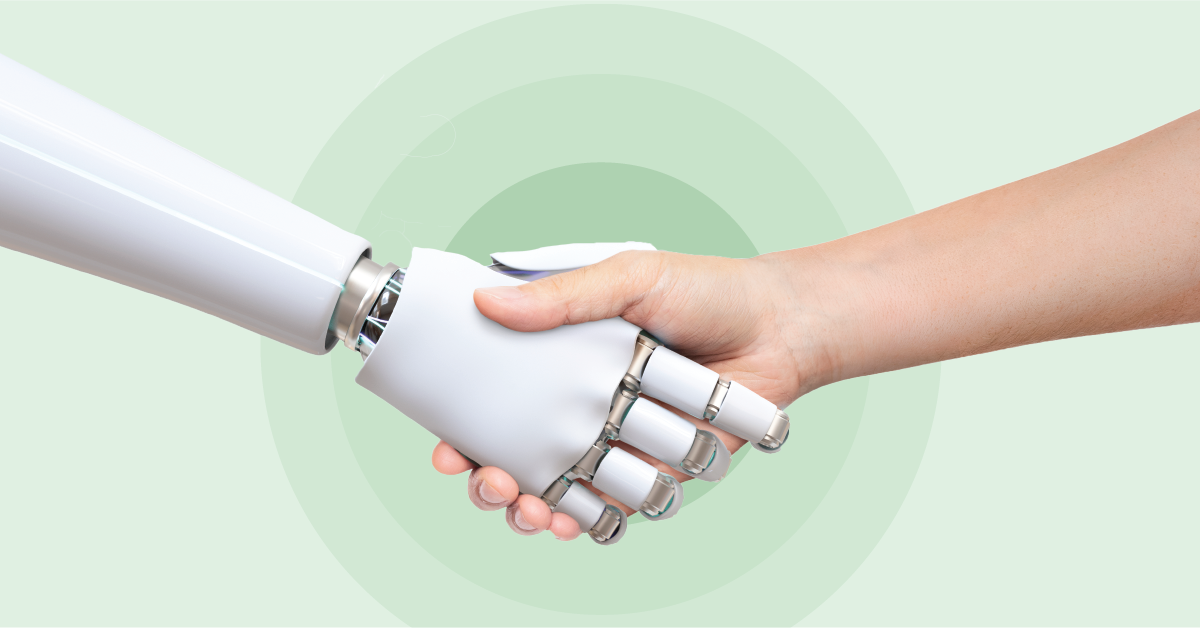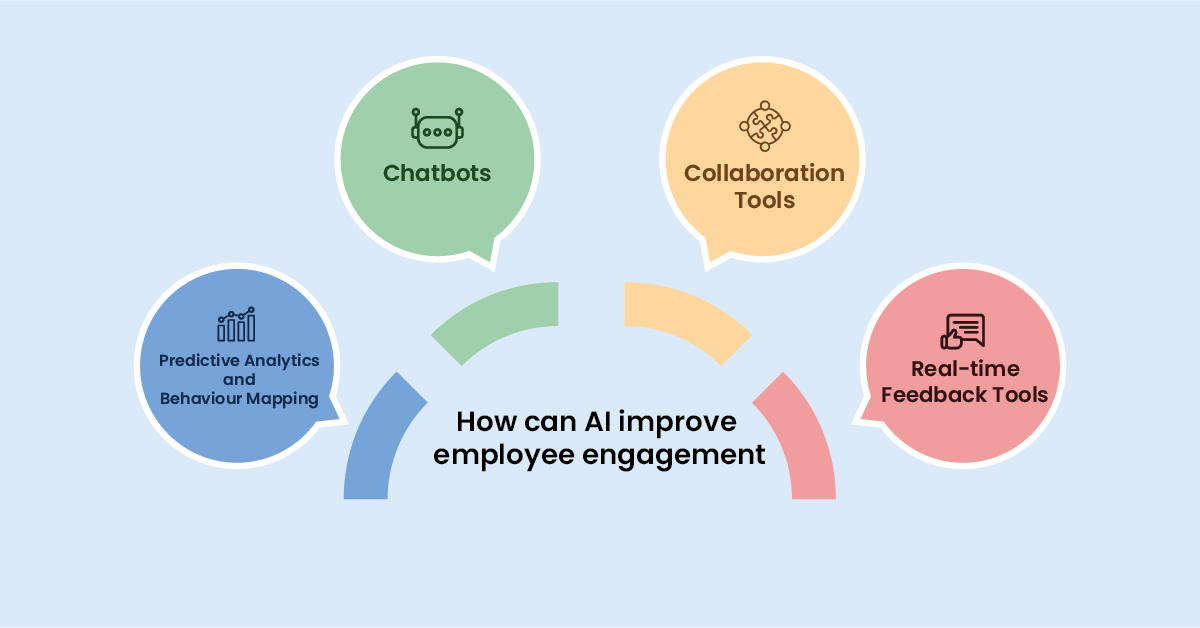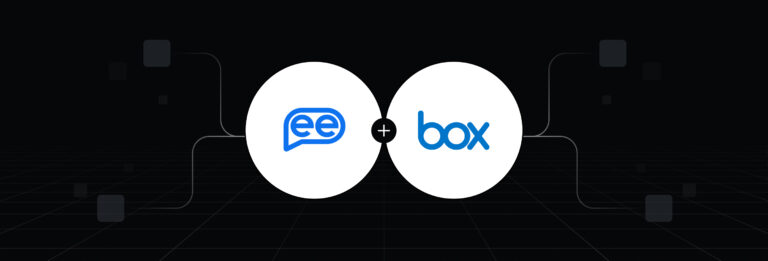The meaning of artificial intelligence is the ability of a computer system to sense, reason, and respond to the environment. Computer systems with advanced AI can engage in sensing, reasoning, and responding in the most complex environments.
Unprecedented disruptions have shifted the focus of organizations towards employees and their well-being. We are currently in the employees market, where employees are demanding changes and organizations are earnestly listening, adapting and ultimately improving their ways. Recently, the implementation of AI in employee engagement has been one such revolutionary change that gave the traditional methods of employee engagement the much needed boost.
Artificial Intelligence is revamping the way people are being recruited, trained and retained in organizations across the world. Evidently, organizations are significantly investing in employee engagement initiatives to deep dive into the mindset of their workforce. Successful organizations are using cutting-edge employee engagement chatbots to gain data backed insights and build a high-yielding development plan. AI algorithms are helping the management eliminate the ambiguity and guesswork of employee motives and aiding employees reach their goals more efficiently.
What does AI in engagement mean for businesses today? Let’s look at the paragraphs below that shares at length the future of employee engagement.
What is intellectual employee engagement? Why is it needed?

As employees acquire more clarity about their expectations from their employer, HR professionals are struggling to hire, onboard and retain their best talent. As a result, keeping a constant tab on the mindset of employees is much needed to anticipate their actions. Prior to AI, the usual employee engagement methods have played an important role in making employees feel valued and cared for but the results have not proved highly rewarding.
The fundamental reasons employees exit an organization are:
1. Unable to foresee career growth
One-third of employees quit because they felt a lack of visible career path forward, a sense of inaction, and very few opportunities to develop their skills.
2. Monotonous work
One in five exited employees felt that they were doing monotonous and operational work with lesser opportunities to learn.
3. Toxic relations
Lack of manager’s support in growth, unethical/unprofessional behaviour, excessive workload/extra pressure, and lack of appreciation pushed a significant fraction of employees to leave.
4. Feeling underpaid
Employees felt like they were compensated less than industry standards or were unhappy with their appraisals.
Recent research conducted by Bersin by Deloitte suggests that the issues of “retention and engagement” have risen to the number-two spot in the minds of many business leaders, second only to the challenge of building global leadership.
Employee engagement is essential for organizations to function successfully and smoothly. A highly motivated workforce that has an inbuilt sense of ownership is the dream of every HR. However, building this dream workforce is now beyond conducting one-on-one interactions, it now lies on the lines of technology, automation, innovation and iteration.
Why is the existing employee engagement system failing?

The current employee engagement system is failing to accurately measure the emotions of employees. According to a 2017 study by Maritz Motivation Solutions, 78% of companies have a documented employee engagement strategy. Evidently, organizations are increasingly investing in employee engagement. However, one remarkably important point is being missed, that is getting an understanding of employee emotions and how they relate to employee engagement at work.
Some of the most common positive and negative emotions felt at work are:
- Enthusiastic
- Comfortable
- Satisfied
- Frustrated
- Anxious
- Stressed
“Artificial Intelligence and Natural Language Processing can help you analyze employee sentiment in real-time, identify top drivers of engagement and disengagement, suggest improvement areas for managers, predict attrition of high-performing employees, and automate your employee engagement initiatives.”
Asking the right questions about the emotions of the employees can give you valuable insight to their actual engagement levels. Employees are very well aware about the fact that each employee engagement initiative is directly related to increasing revenues. Therefore, well-thought pulse surveys, work from home surveys play an important role.
HR leaders need to ensure that their EE programs are bringing a genuine change in the work environment and it is not just another initiative that employees roll their eyes at. The very first step is to earn the trust of your employees and then show it through your actions to get a sense of what is exactly happening. Organizations can very easily control a major part of the factors that affect employees’ desire to work hard for them. And, it is done through empathetic work environment, meaningful job role, a compassionate management, and rewarding leadership.
Let’s understand how HR leaders can achieve the above mentioned goals with the help of advanced technology.
Intellectual employee engagement – Revamping the engagement objective
The marriage of artificial intelligence and employee engagement is intellectualizing the world of employee engagement. AI-backed technology combines human experience with innovation and builds key insights for effective organizational development. AI uses machine learning algorithms to imitate cognitive functions that allow machines to make more human-like decisions. With organizations becoming more employee centric, AI is helping them build a happier work environment, eliminate bias and encourage valuable initiatives that are more focused on holistic employee development.
HR professionals are significantly leveraging AI in employee engagement, as well as in hiring, developing and retaining people. Data-backed technologies are enabling and empowering HRs to set and achieve tangible goals and create impactful business processes. With HR functions becoming accountable for influencing business results, the most important step HR leaders can take is to harness the power of technology that anticipates problems and recommends solutions.
In total, over 15% of today’s HR job roles will be supported by augmentation technologies in the next five years. This number will increase to more than 35% in the next ten years, calling for the urgent development of specific training programs to upskill the affected workforce. – Automation and Augmentation Report by CapeGemini
AI-backed employee engagement is now paving the path for intellectual employee engagement. ‘
Let’s look at some of the reasons to adopt and adapt to this new avatar of engagement.
How AI can Improve Employee Engagement?

Artificial intelligence has unlimited potential and benefits, it can easily automate exhausting and repetitive tasks, and speed up the search for talent, boosting employee engagement, and reducing attrition. Organizational leaders and human resources executives believe that merging artificial intelligence(AI) into HR functions like onboarding and engagement can and will improve the overall employee experience.
The implementation of artificial intelligence technologies in employee engagement has led to revealing real-time insights that further derive organic engagement. Tools such as predictive analytics, behavior mapping, collaboration tools, real-time feedback tools, and interactive employee engagement chatbots are changing the way employee engagement was conducted and measured.
These AI-powered tools are helping organizations recognize patterns in the behavior of employees and making it easier to gather meaningful insights. AI technology with the help of email conversation analysis, and biometric data helps in raising any red flags that might turn into bigger concerns in the future. These data-driven insights and sentiment analysis are clear indicators of existing employee engagement levels and how they can be improved in the future.
As per a study by McKinsey Global Institute, global organizations have invested approximately USD 40 billion in Artificial Intelligence technology in 2016. While a major part of this investment went into research and development, about 10% was pushed towards the implementation of AI technologies towards improving operations and boosting engagement.
Artificial Intelligence is going to be the driver of change and enhancement in employee engagement initiatives. Let’s have a look at some of the extensions that it brings to the table:
-
Predictive analytics and behavior mapping
Organizations, often, tend to rely on an annual system to measure employee satisfaction and work-performance, but AI can help in monitoring employees’ mental wellbeing, behavioral patterns and engagement levels through data-backed insights and in real-time. It helps in measuring engagement levels by analyzing historical and current data, identifying patterns, predicting trends and offering customized solutions. For instance, if there is a group of people who are disengaged or planning to exit the company, AI can easily identify this set of dissatisfied employees and help HRs in retaining some of them, if not all.
-
Employee Engagement Chatbots
Communication is an essential part of employee engagement, therefore it is really important for employees to be able to express without the fear of judgment. For most of the employees, the connection to their workplace is now increasingly being influenced by digital interactions and the interfaces that enable them. Implementation of artificial intelligence tools such as chatbots is helping significantly in making these communications interactive, collaborative and clear. The adoption of employee engagement chatbots and virtual assistants is probably one of the greatest shifts in recent times, allowing organizations to interact with employees using advanced intelligence and natural language processors, thereby creating a greater impact than raising tickets, command lines, and mouse clicks.
“We use AI to automate sending surveys and follow ups, which helps us save time and resources. There are many ways that automation/AI can help with employee engagement. Some of these include predicting attrition, analyzing employee sentiment, and identifying improvement areas. We think that chatbots are a great way to engage employees. They are a new trend in the HR industry, and they offer a lot of potential for engaging employees in new and innovative ways.”
-
Collaboration Tools
AI algorithms and data analysis help the management identify employees who can work well together as a group and derive engagement to build a more productive work environment. These employee engagement bots are employed to build teams where individual skills of employees complement each other and add to the revenue of the company. Efficiency in a team can be effectively achieved by creating elaborate team structures and hierarchies that consider personal abilities and complementing skills. Artificial intelligence technology is evidently making team building exercises fulfilling and driving better collaboration throughout the organization.
-
Real-time Engagement Feedback Tools
Real-time engagement feedback surveys are the ultimate gateway to understanding what is exactly going on in the mind of your employees, how are they feeling, what are they interacting most about the organization and their likes/dislikes related to the work environment. By employing AI-backed feedback platforms, businesses can collate real-time feedback from their employees and know the exact areas where they need to focus their efforts to increase employee productivity and performance. These advanced tools are highly responsive and predict the sentiments of employees, their workplace moods and the general satisfaction, highlighting even the smallest of issues that might get overlooked in an otherwise human interaction scenario.
Benefits of AI in employee engagement

Employee engagement is an ever-evolving process, which commences at the very first step of on-boarding. From welcoming new employees into the company culture to conducting exit interviews, against the backdrop of a fluid and open workplace, AI can remarkably impact the holistic cycle of employee engagement. What benefits AI-backed engagement can offer a business, let’s have a look at the list:
-
Organic Engagement:
AI algorithms are great facilitators for advanced and predictive sentiment analysis. Backed by a deeper analysis of email conversations, and biometric data, companies are finding it easier to promote a sense of belonging, identify red flags and create an engaging environment around. These employee engagement chatbots can spark interest through recommendations that spike employee interest levels.
-
Data-backed Decision Making:
Valuable insights provided by AI help decision-makers take effective decisions. Undisturbed by topical boundaries and time zones, implementing AI can enable nuanced decision-making that is entirely based on complete content analysis.
-
Fairness and Unbiasedness:
Eliminating all kinds of biases and human prejudices, AI backed engagement platforms help in building equal and diverse workplaces. Artificial Intelligence helps in building a platform that is swift and offers an efficient grievance mitigation system where conflicts are addressed quickly.
-
Increased Productivity:
As less time will be spent on repetitive and tedious tasks, HR, marketing and IT teams can use their free time in building business development strategies. Implementation of automated processes can increase productivity and run more efficiently without human error. Many manufacturing houses, healthcare and financial institutions are now making key decisions through automated mechanized platforms.

-
Improved Communication:
Artificial intelligence can notably improve internal and external communication by enabling personalized interactions for each professional, allowing employees to feel heard and valued. These forms of interactions whether through chatbots or automated feedback surveys assures employees confidentiality and lets them express openly.
-
Easy learning and development activities:
Upskilling and reskilling is an area where AI can make a notable change. Whether your employees are onsite or working remotely, AI can be effortlessly used to build customized training and development programs based on the analysis of areas where training may be necessary for the employees. In addition, companies can employ AI to track the progress of employees and provide feedback accordingly. This will help employees feel supported and motivated in their personal and professional growth.
-
Streamlined Conflict Resolution
Artificial intelligence algorithms can be used in conflict resolution as it is more care-sensitive and objective when handling workplace conflicts than human intelligence. Automated mechanized platforms are most preferred to handle sensitive information like credit histories and employee records. These platforms also help in clearing the way for more meaningful connections between employees who might have not been able to build connections due to differences in their age or position within the company.
What are the essential considerations for investing in an AI engagement solution?
Finding the best AI-powered employee engagement software can be a little confusing. Given numerous options available in the market offering varied features might lead you to buying a engagement tool that might cater to some of your requirements but not all of them.
An employee engagement tool is the most crucial part of engagement strategy. That’s why, having a clarity of what kind of tool you need, why do you need it and what business outcomes you are seeking with it is neccessary. Apart from clarity, here are five considerations you must take care of before investing in an AI employee engagement solution:
Is it User-friendly?
When introducing a new employee engagement tool to your employees, do keep in mind that not all members are tech-savvy. Some employees adopt the new technology quickly while others take some time to get familiar with the interface. Therefore, the engagement solution should offer a positive user experience that will futher lead high adoption rates and high participation rates.
What can you measure?
Do remember, what gets measured, gets managed. Thus, the employee engagement tool should define very clearly the metrics that will be measured. Tracking these metrics will determine how effectively the solution is working for your organization. Measuring metrics such as employee absenteeism, retention rate, attrition rate, participation rate, can help you make ROI-based decisions.
Is it scalable?
An ideal employee engagement solution should cater to organizations of all sizes. Scalability is an essential feature of an AI employee engagement platform. A scalable solution can save a lot of time and money in the long haul. The solution should be able to grow as your team grows. Additionally, it should also support your teams working remotely and from distributed offices.
The value addition?
After all, the most important question is what value it is going to add? Your employee engagement solution will measure and impact the human element of your organization. Therefore, it should offer data-driven insights and sentiment analysis to clearly indicate the existing employee engagement levels and how they can be improved in the future.
Success Stories:
ACG built a highly engaged remote workforce employing Leena AI’s WFH surveys:
ACG World, an integrated pharma manufacturing solutions, announced Work From Home (WFH) for the entire financial year right at the pandemic’s beginning. The newly introduced remote working brought new challenges for the leaders. This called for an HR digital solution platform that could help ACG enhance employee experience and tackle the challenges in a timely and accurate manner. With the implementation of Leena AI, employees got a platform where they could voice their opinion and share feedback about their WFH experience. Leena AI shared employee feedback with the HR leaders and managers in real-time and helped them take corrective actions immediately.
The Impact:
- Increase in the participation rate to 91%
- Accurate analysis and deeper insights
- Real-time access to the employee feedback
- Ease of connectivity with the end-users
To know more about ACG’s workplace change, read the case study in detail here.
How UHA built an engaged workforce in changing times with the help of Leena AI’s Pulse Surveys:
UHA offers the largest physician network in Hawai‘i. Most of UHA’s associates were working remotely and this resulted in a need to keep them connected and engaged. The organization was looking for a robust platform to drive remote and real-time employee engagement and collect feedback throughout the employee lifecycle. With the implementation of Leena AI’s pulse surveys, UHA was able to create a culture of feedback where associates feel confident to share their views. Leena AI’s customizable avatar, easy integration prowess for easy deployment, bank of questions to choose from, a team of subject matter experts to consult with, and analytics to understand their employee pulse better made for a great solution for UHA.
The Impact:
- More than 75% of UHA’s associates participated in the pulse survey
- Significant increase in the quality and quantity of responses and feedback
- Could identify the problem areas and add them to its 2022 business plan
To Sum up
The rise of AI will transform how organizations manage employee engagement in the next few years. With the capabilities offered by AI software, companies will get better at recruiting and engaging employees for the long term. AI applications and predictive analysis will pave the way for better understanding of human behavior that can drive decisions in favor of improved employee engagement metrics. It will be exciting to see how soon global companies understand the trends and possibilities of AI and implement the technology in recruitment, learning and development and engagement.
Leena AI’s stellar technology powered by AI possesses great potential to revamp your employee engagement strategies by automating routine feedback surveys, eliminating human bias, delivering advanced behavioral analytics and helping create a better work environment.
Explore Leena AI's Employee Engagement Surveys
Schedule a Demo NowWhat experts are saying about Leena AI?
Rishika Verma, Senior Recruiting Coordinator, Airbnb Capability Center:
“Leena AI’s tool has helped enhance and upscale our existing ways of working, not just for the survey recipients but also for the recruiting team at Airbnb. The detailed dashboard has helped us get better and deeper insights, helping us improve stakeholder experience on specific parameters. Leena AI’s quick turnaround time and collaborative team makes us look forward to more partnerships in the future.”
Deepika Tanwar, HR Business Partner, Provana:
“Leena AI overcame our business expectations by providing us with a smart solution to evaluate and give us insights into our employees on a regular basis – employee satisfaction ratio, insights on employee work culture improvement, pain point analysis, and much more. Prompt service, dedicated team.”
Bimla Bambha, Senior Vice President HR, Bajaj Capital Ltd.:
“In such a fast-changing environment, we felt the need to keep in constant touch with our people as they are spread across India. Leena AI came as a big-time solution for taking our engagement to the next level as it was an AI-based adaptive engagement tool. Leena AI’s tool has given us the real-time pulse of our team members, which further helps us to understand what is working well in our system and what requires improvement.”
Frequently Asked Questions
What is AI in employee engagement?
AI-backed technology in employee engagement initiatives mean combining human experience with innovation and building key insights for effective organizational development. AI uses machine learning algorithms to imitate cognitive functions that allow machines to make more human-like decisions.
How can AI improve employee engagement?
- Predictive Analytics and Behavior Mapping
- Employee Engagement Chatbots
- Collaboration Tools
- Real-time Engagement Feedback Tools
What are the benefits of AI in employee engagement?
- Organic Engagement
- Data-backed Decision Making
- Fairness and Unbiasedness
- Increased Productivity
- Improved Communication
- Easy Learning and Development Activities
- Streamlined Conflict Resolution







6 Comments